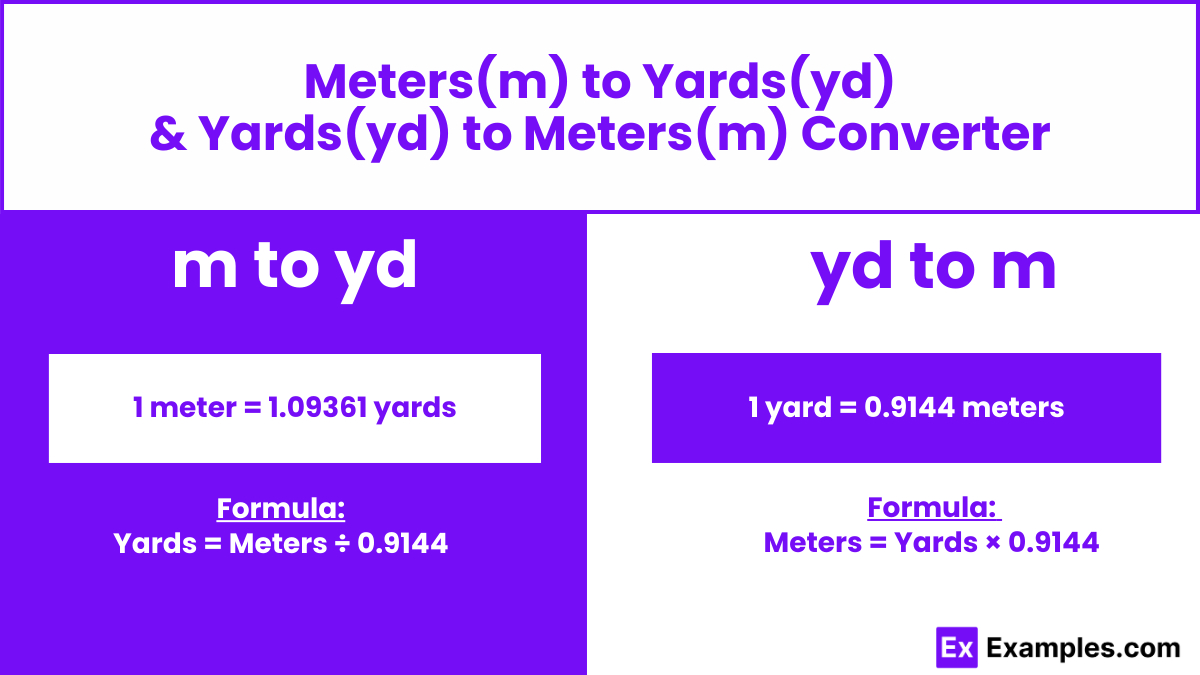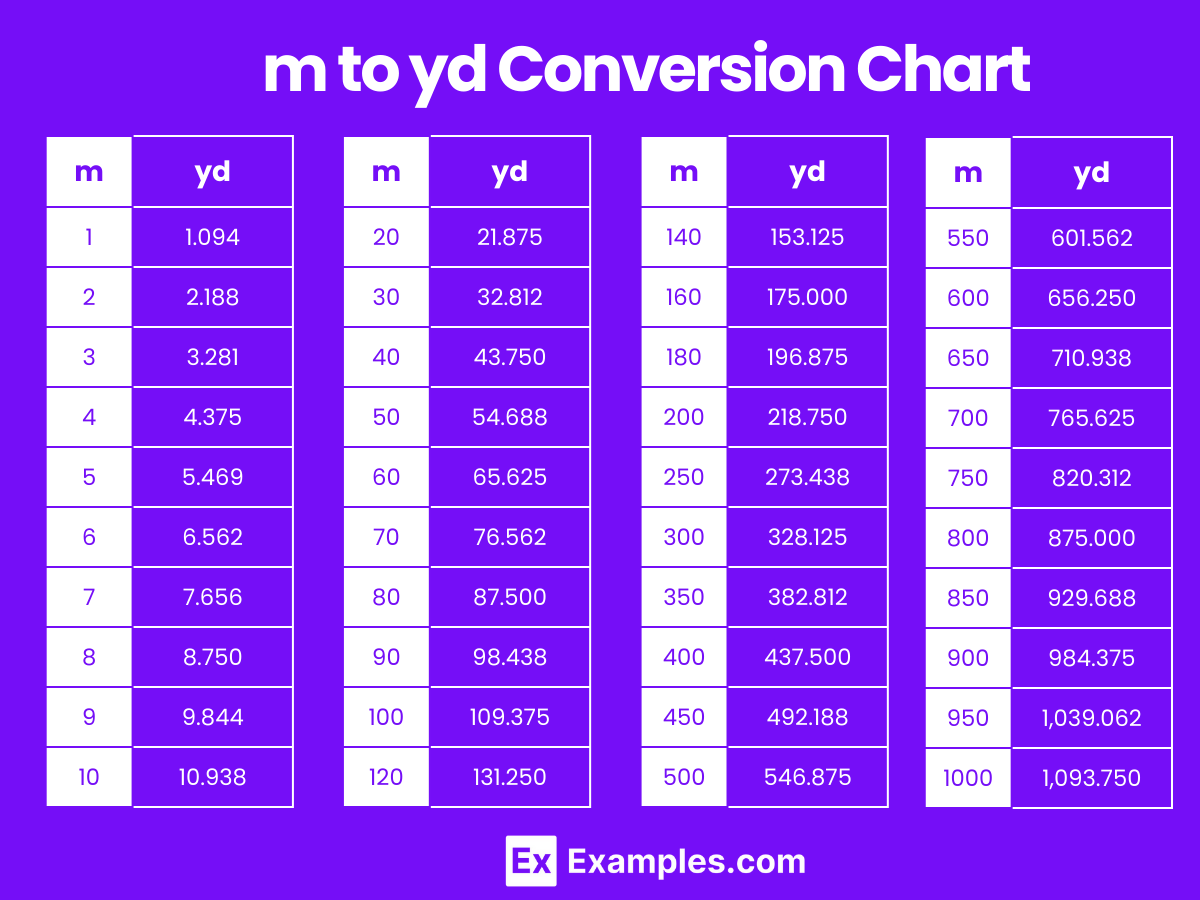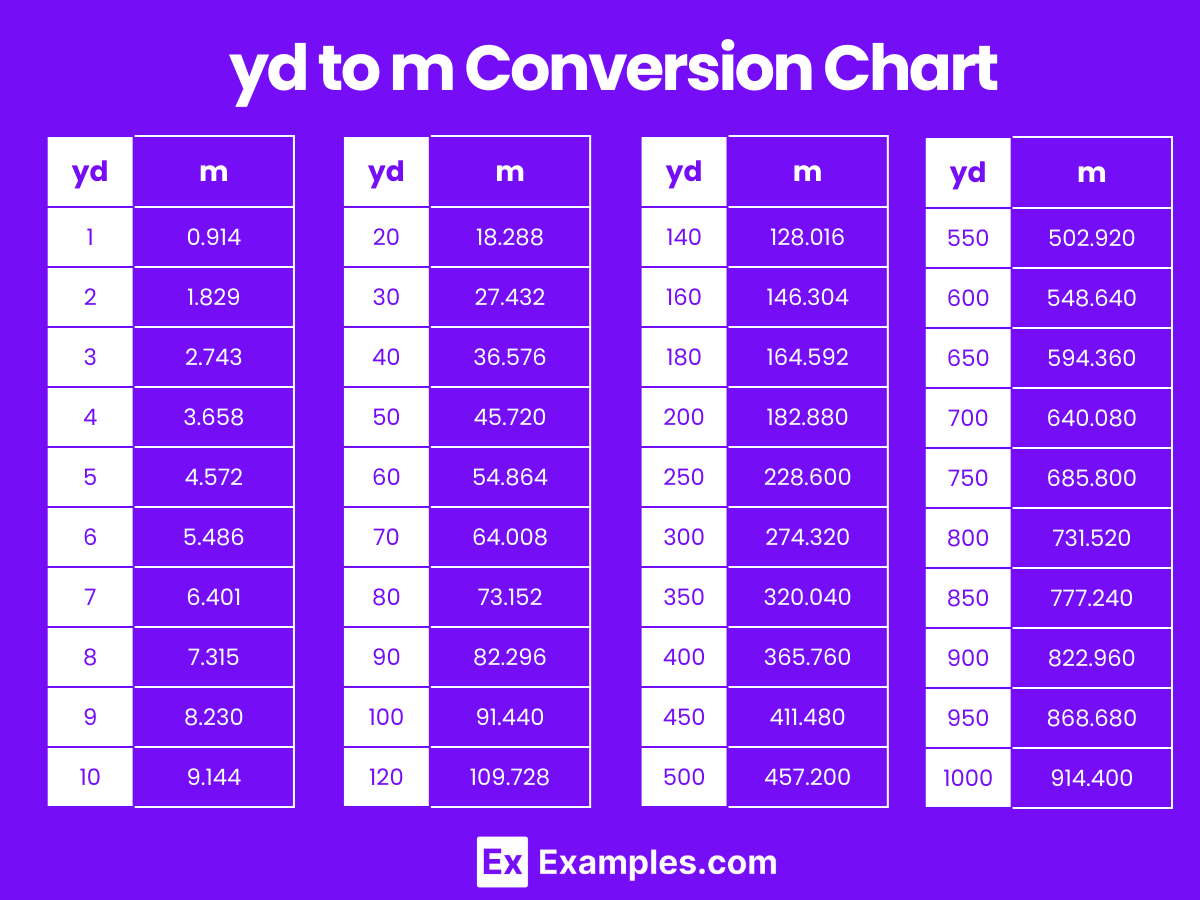Easily convert your length measurements from meters to yards and vice versa on Examples.com by inputting the values you need.
m to yd
Formula: Length in yd (yd) = Length in meters (m) × 1.09361
Meter:
Yard:
| Meters | Yards |
|---|---|
| 1 | 1.093610 |
yd to m
Formula: Length in meters (m) = Length in yards (yd) ÷ 1.09361
Yard:
Meter:
| Yards | Meters |
|---|---|
| 1 | 0.914403 |

Length Converters to Meter (m)
| Centimeter to Meter | Millimeter to Meter | Micrometer to Meter |
| Nanometer to Meter | Mile to Meter | Yard to Meter |
| Feet to Meter | Inch to Meter | Nautical Mile to Meter |
| Kilometer to Meter |
Length Converters to Yard (yd)
| Kilometer to Yard | Meter to Yard | Centimeter to Yard |
| Millimeter to Yard | Micrometer to Yard | Nanometer to Yard |
| Mile to Yard | Feet to Yard | Inch to Yard |
| Nautical Mile to Yard |
Conversion Factors:
Meters to Yards: 1 yard = 0.9144 meters
Yards to Meters: 1 meter = 1.09361 yards
How to Convert Meters to Yards:
To convert meters to yards, divide the number of meters by 0.9144.
Yards = Meters ÷ 0.9144
Example: Convert 2000 meters to yards.
Yards = 2000 ÷ 0.9144 = 2187.22 yards
How to Convert Yards to Meters:
To convert yards to meters, multiply the number of yards by 0.9144.
Meters = Yards × 0.9144
Example: Convert 3 yards to meters.
Meters = 3 × 0.9144 = 2.7432 meters
Meters to Yards Conversion Table
| 1 m | 1.094 yd |
| 2 m | 2.188 yd |
| 3 m | 3.281 yd |
| 4 m | 4.375 yd |
| 5 m | 5.469 yd |
| 6 m | 6.563 yd |
| 7 m | 7.656 yd |
| 8 m | 8.750 yd |
| 9 m | 9.844 yd |
| 10 m | 10.938 yd |
| 20 m | 21.875 yd |
| 30 m | 32.813 yd |
| 40 m | 43.750 yd |
| 50 m | 54.688 yd |
| 60 m | 65.625 yd |
| 70 m | 76.563 yd |
| 80 m | 87.500 yd |
| 90 m | 98.438 yd |
| 100 m | 109.375 yd |
m to yd Conversion Chart

Yards to Meters Conversion Table
| Yards | Meters |
|---|---|
| 1 yd | 0.914 m |
| 2 yd | 1.829 m |
| 3 yd | 2.743 m |
| 4 yd | 3.658 m |
| 5 yd | 4.572 m |
| 6 yd | 5.486 m |
| 7 yd | 6.401 m |
| 8 yd | 7.315 m |
| 9 yd | 8.230 m |
| 10 yd | 9.144 m |
| 20 yd | 18.288 m |
| 30 yd | 27.432 m |
| 40 yd | 36.576 m |
| 50 yd | 45.720 m |
| 60 yd | 54.864 m |
| 70 yd | 64.008 m |
| 80 yd | 73.152 m |
| 90 yd | 82.296 m |
| 100 yd | 91.440 m |
yd to m Conversion Chart
Difference Between Meters to Yards
| Aspect | Meters | Yards |
|---|---|---|
| Length Measurement | Meters are the standard unit of length in the International System of Units (SI). | Yards are commonly used in the United States and the United Kingdom for measuring lengths. |
| Conversion Factor | 1 meter is equivalent to approximately 1.094 yards. | 1 yard is equivalent to approximately 0.9144 meters. |
| Usage | Meters are widely used in scientific and engineering contexts due to their precise measurement. | Yards are often used in everyday situations, such as measuring fabric or distances in sports like football. |
| International Standard | Meters are the internationally accepted standard for length measurement. | Yards are primarily used in countries that follow the imperial system, such as the United States and the United Kingdom. |
| Relation to Other Units | Meters are related to other SI units, such as centimeters and kilometers, making conversions within the metric system straightforward. | Yards are related to other imperial units, such as feet and mile, which are commonly used for measuring distance in everyday life. |
| Sports Measurement | Meters are used to measure track and field events like sprinting and long jump in athletics. | Yards are often used to measure distances in sports like American football, where the field length is measured in yards. |
| Historical Context | The meter was originally defined as one ten-millionth of the distance from the equator to the North Pole, making it a universal standard of measurement. | The yard has historical roots dating back to medieval times when it was defined as the distance from the tip of King Henry I’s nose to the end of his thumb. |
| Global Adoption | The meter is widely adopted around the world as the standard unit of length in most countries. | While the yard is primarily used in the United States and the United Kingdom, its usage is limited in many other parts of the world where the metric system is preferred. |
1. Solved Examples on Converting Meters to Yards
Example 1: Convert 10 meters to yards
10 meters / 0.9144 = 10.9361 yards
Result: 10 meters is approximately 10.9361 yards.
Example 2: Convert 20 meters to yards
20 meters / 0.9144 = 21.8723 yards
Result: 20 meters is approximately 21.8723 yards.
Example 3: Convert 35 meters to yards
35 meters / 0.9144 = 38.2815 yards
Result: 35 meters equals about 38.2815 yards.
Example 4: Convert 50 meters to yards
50 meters / 0.9144 = 54.6807 yards
Result: 50 meters is approximately 54.6807 yards.
Example 5: Convert 75 meters to yards
75 meters / 0.9144 = 82.0225 yards
Result: 75 meters equals about 82.0225 yards
2. Solved Examples on Converting Yards to Meters
Example 1: Convert 10 yards to meters
10 yards × 0.9144 = 9.144 meters
Result: 10 yards is approximately 9.144 meters.
Example 2: Convert 20 yards to meters
20 yards × 0.9144 = 18.288 meters
Result: 20 yards is approximately 18.288 meters.
Example 3: Convert 35 yards to meters
35 yards × 0.9144 = 32.004 meters
Result: 35 yards equals about 32.004 meters.
Example 4: Convert 50 yards to meters
50 yards × 0.9144 = 45.72 meters
Result: 50 yards is approximately 45.72 meters.
Example 5: Convert 75 yards to meters
75 yards × 0.9144 = 68.58 meters
Result: 75 yards equals about 68.58 meters.
1. Why do we need to convert meters to yards?
Converting meters to yards can be useful when dealing with measurements in different systems, especially in contexts where yards are the preferred unit of measurement, such as in some sports or construction projects.
2. Why is the conversion factor from meters to yards not an even number?
The conversion factor from meters to yards is not an even number because the meter and yard belong to different measurement systems that evolved independently over time.
3. Can I use an online calculator to convert meters to yards accurately?
Yes, online calculators can provide accurate conversions from meters to yards. However, always ensure you’re using a reliable and trusted calculator for accurate results.
4. How accurate is the conversion between meters and yards for practical purposes?
The conversion between meters and yards is sufficiently accurate for most practical purposes, as the difference between them is relatively small and typically negligible for everyday measurements.
5. Why are meters preferred over yards in scientific and engineering contexts?
Meters are preferred in scientific and engineering contexts because they are part of the metric system, which is based on powers of ten and offers advantages in terms of simplicity, coherence, and ease of conversion.
6. Can I convert large distances from meters to yards?
Yes, you can convert large distances from meters to yards using the same conversion factor. However, for very large distances, it may be more practical to use tools or software for accurate conversions.
7. What is bigger a yard or meter?
A yard is slightly smaller than a meter. Specifically, one meter is approximately 1.094 yards. This means that in terms of length, a meter is slightly longer than a yard. Understanding this difference is important when converting measurements between the metric system and the imperial system.
8. Are meters and yards interchangeable units of measurement?
While meters and yards measure length, they belong to different systems of measurement and are not directly interchangeable. However, they can be converted from one to the other using an appropriate conversion factor.


